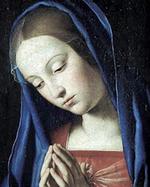Catholic World News News Feature
Pope declares plenary indulgence for December 8 November 29, 2005
Pope Benedict XVI has declared a plenary indulgence for Catholics who honor the Virgin Mary on the feast of the Immaculate Conception, December 8.
In a November 29 announcement, the Vatican said that Pope Benedict has declared the indulgence to mark the 40th anniversary of the conclusion of the Second Vatican Council. The announcement indicates that the Pope "when he renders public homage of praise to Mary Immaculate, has the heartfelt desire that the entire Church should join with him, so that all the faithful, united in the name of the common Mother, become ever stronger in the faith, adhere with greater devotion to Christ, and love their brothers with more fervent charity."
A plenary indulgence, as Pope Paul VI explained in Indulgentiarum Doctrina in 1967, is "a remission before God of the temporal punishment due to sins whose guilty has already been forgiven." Indulgences can be decreed by the Pope or, under certain restrictions, bishops. The faithful can obtain indulgences for themselves or for the souls in Purgatory.
The indulgence declared by Pope Benedict may be obtained by those who "participate in a sacred function in honor of the Virgin, or at least least offer open testimony of Marian devotion before an image of Mary Immaculate exposed for public veneration, adding the recitation of the Our Father and of the Creed, and some invocation to the Virgin."
The announcement indicates that those who are ill or otherwise unable to fufill the normal conditions "may obtain a plenary indulgence in their own homes, or wherever they may be, if, with the soul completely removed from any form of sin, and with the intention of observing the aforesaid conditions as soon as possible, they unite themselves in spirit and in desire to the Supreme Pontiff's intentions in prayer to Mary Immaculate, and recite the Our Father and the Creed."
The decree issued on November 29 by the Apostolic Penitentiary, announcing the indulgence, also lists the usual conditions: sacramental Confession, Eucharistic Communion, prayer for the intentions of the Pope, and the removal of attachment to sin. The decree is signed by Cardinal James Francis Stafford and Father Gianfranco Girotti, the penitentiary major and regent, respectively, of the Apostolic Penitentiary. The issue of indulgences, and some abuses of the Church's authority in that realm, became a topic of heated controversy during the Protestant Reformation. The Church's teaching was clarified by the Council of Trent in 1545 to avoid future abuses.
Originally indulgences were issued as a substitute for the often severe penances that were common in the early centuries of the Church. Although the Catholic Church has always claimed the authority to issue indulgences for special occasions or for certain prescribed pious acts, public interest in gaining indulgences has lapsed in recent years. Pope John Paul II made a conscious effort to revive interest in this power of the Church, as has Pope Benedict XVI.
Earlier this year, Pope Benedict granted a plenary indulgence to those young people who participated fervently in the World Youth Day celebrations in Cologne in August. Pope John Paul II had declared plenary indulgences for the Jubilee Year 2000 and again for the Year of the Eucharist, which ran from October 2004 to October 2005.






